Conservatism is a cultural, social, and political philosophy that seeks to promote and to preserve traditional institutions, practices, and values. The central tenets of conservatism may vary in relation to the culture and civilization in which it appears. In Western culture, depending on the particular nation, conservatives seek to promote a range of social institutions such as the nuclear family, organized religion, the military, property rights, and monarchy. Conservatives tend to favor institutions and practices that guarantee stability and evolved gradually. Adherents of conservatism often oppose certain aspects of modernity and seek a return to traditional values, though different groups of conservatives may choose different traditional values to preserve.
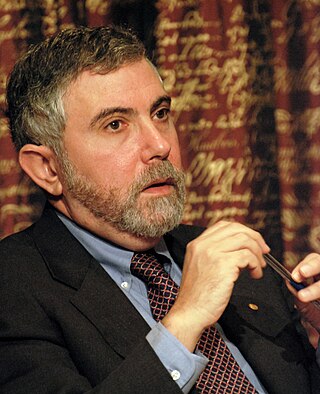
Paul Robin Krugman is an American economist who is the Distinguished Professor of Economics at the Graduate Center of the City University of New York and a columnist for The New York Times. In 2008, Krugman was the winner of the Nobel Memorial Prize in Economic Sciences for his contributions to New Trade Theory and New Economic Geography. The Prize Committee cited Krugman's work explaining the patterns of international trade and the geographic distribution of economic activity, by examining the effects of economies of scale and of consumer preferences for diverse goods and services.
Paleolibertarianism is a libertarian political activism strategy aimed at uniting libertarians and paleoconservatives. It was developed by American anarcho-capitalist theorists Murray Rothbard and Lew Rockwell in the American political context after the end of the Cold War. From 1989 to 1995, they sought to communicate libertarian notions of opposition to government intervention using messages accessible to working and middle-class people of the time, and combining libertarian free market views with the cultural conservatism of Paleoconservatism, while also opposing protectionism. The strategy also embraced the paleoconservative reverence for tradition and religion. This approach, usually identified as right-wing populism, was intended to radicalize citizens against the state. The name they chose for this style of activism evoked the roots of modern libertarianism, hence the prefix paleo. That founding movement was American classical liberalism, which shared the anti-war and anti-New Deal sentiments of the Old Right in the first half of the 20th century. Paleolibertarianism is generally seen as a right-wing ideology.

The Conscience of a Conservative is a 1960 book published under the name of Arizona Senator Barry Goldwater who was the 1964 Republican presidential candidate. It helped revive the American conservative movement and make Goldwater a political star, and it has influenced countless conservatives in the United States, helping to lay the foundation for the Reagan Revolution of the 1980s.
In the United States, conservatism is based on a belief in limited government, individualism, traditionalism, republicanism, and limited federal governmental power in relation to U.S. states. Conservative and Christian media organizations, along with American conservative figures, are influential, and American conservatism is one of the majority political ideologies within the Republican Party. Many of their beliefs come from the Pauline epistles made by Paul the Apostle.
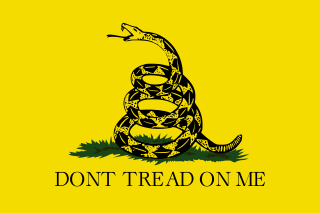
In the United States, libertarianism is a political philosophy promoting individual liberty. According to common meanings of conservatism and liberalism in the United States, libertarianism has been described as conservative on economic issues and liberal on personal freedom, often associated with a foreign policy of non-interventionism. Broadly, there are four principal traditions within libertarianism, namely the libertarianism that developed in the mid-20th century out of the revival tradition of classical liberalism in the United States after liberalism associated with the New Deal; the libertarianism developed in the 1950s by anarcho-capitalist author Murray Rothbard, who based it on the anti-New Deal Old Right and 19th-century libertarianism and American individualist anarchists such as Benjamin Tucker and Lysander Spooner while rejecting the labor theory of value in favor of Austrian School economics and the subjective theory of value; the libertarianism developed in the 1970s by Robert Nozick and founded in American and European classical liberal traditions; and the libertarianism associated with the Libertarian Party, which was founded in 1971, including politicians such as David Nolan and Ron Paul.

Robert Patrick Murphy is an American economist. Murphy is Research Assistant Professor with the Free Market Institute at Texas Tech University. He has been affiliated with Laffer Associates, the Pacific Research Institute, the Institute for Energy Research (IER), the Independent Institute, the Ludwig von Mises Institute, and the Fraser Institute.
In United States politics, modern liberalism is a form of social liberalism. It combines ideas of civil liberty and equality with support for social justice and a well-regulated mixed economy. Modern liberalism opposes the interests of corporations, opposes cuts to the social safety net, and supports a role for government in reducing inequality, increasing diversity, providing access to education, ensuring access to private sector healthcare, regulating economic activity, and protecting the natural environment. This form of liberalism took shape in the 20th century as the voting franchise and other civil rights were extended to a larger class of citizens, most notably among African Americans and women. Major examples of modern liberal policy programs include the New Deal, the Fair Deal, the New Frontier, the Great Society, and the Affordable Care Act.
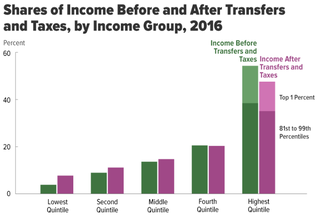
Income inequality has fluctuated considerably in the United States since measurements began around 1915, moving in an arc between peaks in the 1920s and 2000s, with a 30-year period of relatively lower inequality between 1950 and 1980.
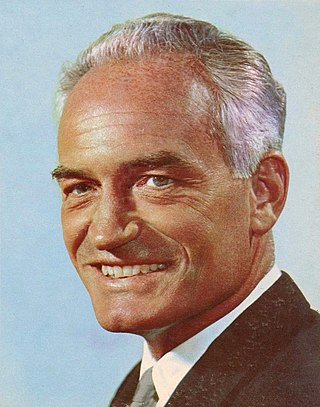
Libertarian conservatism, also referred to as conservative libertarianism and conservatarianism, is a political and social philosophy that combines conservatism and libertarianism, representing the libertarian wing of conservatism and vice versa.

The Betrayal of the American Right is a book by Murray Rothbard written in the early 1970s and published by the Ludwig von Mises Institute in 2007.
Movement conservatism is a term used by political analysts to describe conservatives in the United States since the mid-20th century and the New Right. According to George H. Nash (2009) the movement comprises a coalition of five distinct impulses. From the mid-1930s to the 1960s, libertarians, traditionalists, and anti-communists made up this coalition, with the goal of fighting the liberals' New Deal. In the 1970s, two more impulses were added with the addition of neoconservatives and the religious right.

Larry Martin Bartels is an American political scientist and the Co-Director of the Center for the Study of Democratic Institutions and Shayne Chair in Public Policy and Social Science at Vanderbilt University. Prior to his appointment at Vanderbilt, Bartels served as the Donald E. Stokes Professor of Public Policy and International Relations and founding director of the Center for the Study of Democratic Politics at the Woodrow Wilson School of Public and International Affairs at Princeton University. He was elected a Member of the American Philosophical Society in 2019.
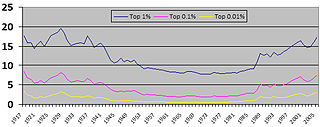
The Great Compression refers to the period of substantial wage compression in the United States that began in the early 1940s. During that time, economic inequality as shown by wealth distribution and income distribution between the rich and poor became much smaller than it had been in preceding time periods. The term was reportedly coined by Claudia Goldin and Robert Margo in a 1992 paper, and is a takeoff on the Great Depression, an event during which the Great Compression started.
Paternalistic conservatism is a strand of conservatism, which reflects the belief that societies exist and develop organically and that members within them have obligations towards each other. There is particular emphasis on the paternalistic obligation, referencing the feudal concept of noblesse oblige, of those who are privileged and wealthy to the poorer parts of society. Consistent with principles such as duty, hierarchy, and organic unity, it can be seen as an outgrowth of traditionalist conservatism. Paternalistic conservatives do not support the individual or the state in principle but are instead prepared to support either or recommend a balance between the two depending on what is most practical.

This timeline of modern American conservatism lists important events, developments and occurrences which have significantly affected conservatism in the United States. With the decline of the conservative wing of the Democratic Party after 1960, the movement is most closely associated with the Republican Party (GOP). Economic conservatives favor less government regulation, lower taxes and weaker labor unions while social conservatives focus on moral issues and neoconservatives focus on democracy worldwide. Conservatives generally distrust the United Nations and Europe and apart from the libertarian wing favor a strong military and give enthusiastic support to Israel.

The Great Divergence is a term given to a period, starting in the late 1970s, during which income differences increased in the US and, to a lesser extent, in other countries. The term originated with the Nobel laureate, Princeton economist and New York Times columnist Paul Krugman, and is a reference to the "Great Compression", an earlier era in the 1930s and the 1940s when incomes became more equal in the US and elsewhere.

End This Depression Now! is a non-fiction book by the American economist Paul Krugman. The book is intended for a general audience and was published by W. W. Norton & Company in April 2012. Krugman has presented his book at the London School of Economics, on fora.tv, and elsewhere.

Causes of income inequality in the United States describes the reasons for the unequal distribution of income in the US and the factors that cause it to change over time. This topic is subject to extensive ongoing research, media attention, and political interest.
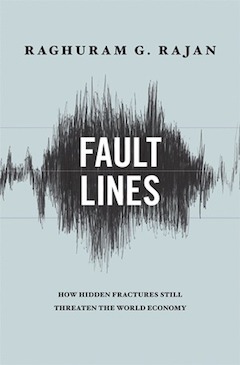
Fault Lines: How Hidden Fractures Still Threaten the World Economy is a 2010 book by Indian economist Raghuram Rajan on the underlying causes of the 2008 financial crisis, and the structural weaknesses present in the world economy. It won the Financial Times and McKinsey Business Book of the Year award in 2010.














